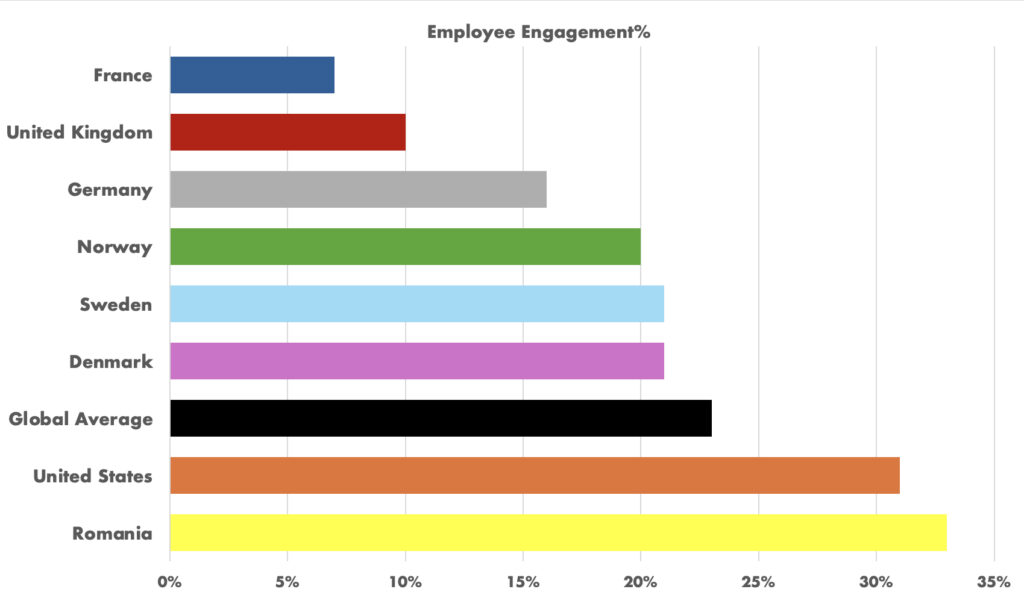In today’s fast-paced and competitive business environment, employee engagement has become a critical factor in driving productivity, profitability, and long-term success. Unfortunately, the UK continues to fall behind other countries in this area, which has far-reaching consequences for both individual businesses and the wider economy. However, with the right approach, this can be turned around.
How the UK Compares in Employee Engagement
According to Gallup’s 2024 State of the Global Workplace Report, only 10% of UK employees are engaged in their roles, placing the UK 33rd out of 38 European countries. By contrast, employee engagement in the United States stands at 31%, with the global average at 23%. Even within Europe, countries such as Romania (33%) and Denmark (21%) demonstrate that higher levels of engagement are attainable.
Despite these concerning figures, the opportunity to improve is significant. Businesses that focus on employee engagement can unlock immense potential. Studies show that organisations with highly engaged employees experience a 23% increase in profitability and a 78% drop in absenteeism.
Why Employee Engagement is Essential
Engaged employees are not only more satisfied in their work, but they also perform better, innovate more, and remain committed to their organisation. When individuals feel a strong connection to their work, they are more likely to exceed expectations, resulting in greater customer satisfaction, improved business performance, and, ultimately, higher profits.
In the UK, where employee engagement is notably low, businesses are missing out on these advantages. Disengaged employees cost companies millions in lost productivity and turnover. Replacing an employee is estimated to cost around £30,000, when factoring in the loss of productivity, recruitment, and training.
Global Insights: What Others Are Doing Well
Countries such as Romania and the United States have managed to foster higher levels of employee engagement. The following factors contribute to their success:
- Recognition and Reward: In highly engaged workplaces, employees feel their contributions are valued. Regular recognition improves morale and fosters a sense of ownership in their work.
- Work-Life Balance: Countries with higher engagement levels often offer flexible working arrangements, helping employees better manage their personal and professional lives.
- Leadership and Communication: Trust in leadership is crucial. Countries with better engagement scores tend to have leaders who communicate openly and genuinely understand and meet their employees’ needs.
The Way Forward: Boosting Employee Engagement in the UK
Improving employee engagement in the UK is not only possible—it is essential for the future of our economy. By focusing on engagement, businesses can drive productivity and profitability while supporting broader economic recovery.
Here are some practical steps UK businesses can take:
- Focus on Employee Wellbeing: Start by understanding what employees need to thrive. Whether through flexible working arrangements, mental health initiatives, or career development opportunities, addressing these needs can significantly improve morale and engagement.
- Build a Culture of Recognition: Acknowledging good work regularly, even through simple gestures, can have a profound impact on employee satisfaction.
- Develop Strong Leadership: Leadership plays a pivotal role in engagement. Effective managers account for 70% of the variation in team engagement, so investing in leadership development is critical.
- Promote Continuous Learning: Providing opportunities for growth and professional development keeps employees motivated and engaged.
The Broader Impact: Business Success Fuels Economic Growth
Engaged employees don’t just benefit their companies—they also strengthen the economy. As businesses increase engagement, they become more productive and profitable, which in turn boosts corporate tax contributions and stimulates economic growth.
Productive employees drive higher profits, while lower turnover reduces the cost of recruitment and training, allowing businesses to reinvest in growth, innovation, and employee development.
By improving employee engagement, UK businesses can help secure a more prosperous future for themselves and the economy at large. Though it may require sustained effort, the rewards—enhanced productivity, profitability, and economic growth—are well worth it.
Action Point: Reflect on the strategies above and decide which steps you will implement to measure and improve employee engagement in your business, reaping the benefits of a more engaged workforce.






